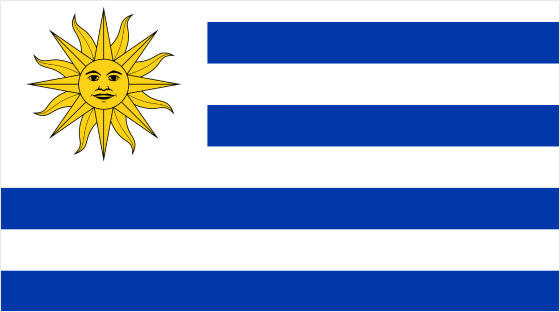Uruguay
Delve into the rise of Uruguay as a software powerhouse in Latin America.

Overview
Founded by the Portuguese in 1680 and declared an independent state in 1825, Uruguay mixes old-fashioned charm with a modern outlook. One of the smallest countries in Latin America, it consistently punches above its weight and is known for its advanced education systems, social security, and liberal social laws.
The number-one software exporter per capita in the region – and third in the world – it’s home to more than 700 IT companies, exporting primarily to the United States and Brazil. State support of the tech industry is a huge benefit to outsourcing in Uruguay. Global IT firms are 100% exempt from income tax on earnings through the export of software and related services.
Uruguay was among the first countries in the world to offer public, accessible, and secular education to all citizens. It also implemented the Ceibal program, based initially on the concept of One Laptop per child, which over time became an educational technology initiative that provides online education to the population.
The Accelerance Global Network is the most curated list of high-quality global teams ever assembled.
800
Developers
Total number of developers in our certified partner network by country
2
Certified Partners
Total number of certified partners in our global network by country.
15hrs
Time Travel (From NY)
Average flight time from NY to the major cities in the country.
70
Partner Innovation capability
The score reflects investment in STEM progrms and IT funding by country.
90
Partner Skill Level
Level of workforce skills and quality of education, including factors such as digital literacy, interpersonal skills, etc.
53
Partner Global Competitiveness
National productivity based on 12 core pillars, including government policy, infrastructure, economic stability, etc.
High
Software Outsourcing Readiness
Overall rating, based on the maturity of the tech sector, socio-political conditions, and on-the-ground research by Accelerance.

Talent Pool & Education
Uruguay offers a high-quality pocket of talent with more than 15,000 IT professionals, 500-plus tech companies, and nearly $1 billion in software exports every year. The country continually ranks highly in technology and innovation awards in Latin America, due to its adoption of fixed broadband, the improvement of international connectivity with a submarine cable system, and all public school children being given access to computers.
A new tax initiative to attract IT professionals to Uruguay was introduced in late 2023. Other national initiatives to support innovation and entrepreneurship include Uruguay XXI, a government organization that incentivizes global companies looking to expand to Uruguay and aims to make the country an investor destination.
In March 2024, Uruguay XXI executive director Sebastián Risso told delegates at South Summit Brazil that Uruguay’s favorable tax system and commitment to environmental and social sustainability made it an attractive destination for startups and investors: “International investors appreciate, above all, Uruguay’s stability, legal certainty, and transparency. We are proud to lead the Americas in rankings of democracy, rule of law, and civil liberties.”
Language
Spanish is the official language. English is not widely spoken in Uruguay, although literacy is higher in the major cities. However, Uruguayan software development engineers are proficient in both spoken and written English, and are reasonably familiar with US business practices and standards.
.png?width=600&height=375&name=Untitled%20design%20(32).png)
Economic Outlook
Uruguay stands out in Latin America as a remarkably egalitarian society that has high income per capita, low levels of inequality, and an almost complete absence of extreme poverty. After a slight contraction in 2023, the Economist Intelligence Unit expects the economy to grow in 2024 as the end of a severe drought leads to a bumper harvest, which will lift agricultural exports and industrial production. Higher real salaries and a higher employment rate will also boost private consumption. Downside risks include a sharper-than-expected economic contraction in Argentina and slower-than-anticipated growth in Brazil.
Climate change has been a factor in the country’s worst drought in 70 years, leading to agricultural losses of more than $1 billion as well as complications in the availability of drinking water and rising food prices. The World Bank considers Uruguay to be a pioneer in financial instruments that reward climate action and says the country is working to extend innovative climate-finance arrangements to lending from multilateral financial institutions. Today, the country has almost phased out fossil fuels in electricity production, with more than 90% of its power coming from renewables.
Political Conditions
Uruguay boasts the longest continuous democratic history of any Latin American nation. Since the early 20th century, the country has built a democratic welfare state which prospered in the first half of the century on the back of agricultural exports.
As expected, finding a winner between two moderate parties in the October 2024 presidential election required a second round vote (held when no party gains 50% in the first round) with center-left opposition candidate Yamandu Orsi securing victory by a few points, with 49.77% of the vote to conservative Alvaro Delgado’s 45.94%.
The result makes the South American nation of 3.4 million people the latest to rebuke the incumbent government in a year of landmark, and often bitter, elections around the world. However, the changing of the guard in Uruguay came with a good deal of decorum, with Delgado and Uruguay’s departing president, fellow National party member Luis Lacalle Pou, offering to help with the transition.
Orsi, a working-class former history teacher and two-time mayor, pledged a “modern left” policy approach for the country where crime and corruption were prominent election issues.
Learn more about our customer stories.
Looking for a customer story in a specific technology or industry? Discover compelling customer narratives within a specific technology or industry that resonate with your unique software development needs.


.png?width=300&name=Copy%20of%20WEBSITE%20Stop%20Chasing%20Low%20Hourly%20Rates%20Unlock%20the%20True%20Value%20of%20Offshore%20Development%20(450%20x%20253%20px).png)



